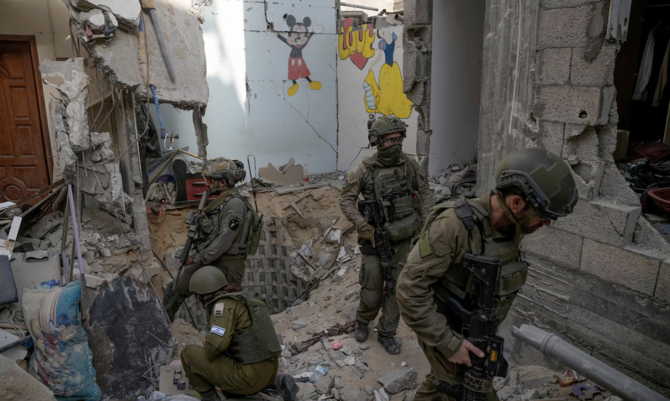LONDON: The Jewish Chronicle has removed several articles from its website over allegations that the journalist behind them, Elon Perry, fabricated information about the conflict in Gaza and his professional life.
The articles, supposedly based on sources within Israeli intelligence, detailed military operations in Gaza as well as what appeared to be highly sensitive information on Hamas leader Yahya Sinwar.
The world’s oldest Jewish newspaper issued a statement saying: “The Jewish Chronicle has concluded a thorough investigation into freelance journalist Elon Perry, which commenced after allegations were made about aspects of his record.
“While we understand he did serve in the Israel Defense Forces, we were not satisfied with some of his claims.
“We have therefore removed his stories from our website and ended any association with Mr Perry.
“The Jewish Chronicle maintains the highest journalistic standards in a highly contested information landscape and we deeply regret the chain of events that led to this point.
“We apologise to our loyal readers and have reviewed our internal processes so that this will not be repeated.”
Perry’s articles came under suspicion after several journalists were unable to verify key details, and last week his stories were described as “fabrications” in a report published by Israeli media.
There have even been suggestions in Israel that articles with false information have been planted in Western media, including in German tabloid Bild, which are supportive of Israeli Prime Minister Benjamin Netanyahu’s position on Gaza.
On Sept. 4, for instance, Netanyahu claimed in a press conference that Sinwar could use the Philadelphi Corridor between Gaza and Egypt to escape with hostages if the area was not under Israeli control.
The next day, an article by Perry was published in the JC stating that Israeli intelligence claimed to have proof that this was Sinwar’s plan based on information obtained by interrogating a senior Hamas figure and documents found in Gaza.
A spokesperson for the Israeli military described the story as “baseless” after it was shared by Netanyahu’s wife and son on social media.
Questions have also been raised about Perry’s history serving in the Israeli military, including that he was involved in the Entebbe hostage rescue mission in 1976.
Perry also claims to have worked as a professor in Tel Aviv for 15 years, which has been questioned by journalists.
One of the journalists involved in disputing Perry’s claims, Ben Reiff of Israeli outlet +972, posted on X: “It seems that by firing Elon Perry @JewishChron is hoping to put this whole affair to bed, as if decisions weren’t made at the very top to employ a fake journalist, publish nine fake articles without verifying sources, and use the paper (as) an active agent in a pro-Bibi influence op.”
The JC, founded in 1841 and a once much-respected publication in the UK, has faced questions over its rightward editorial direction under its editor, Jake Wallis Simons, and over its ownership in recent months.
Earlier this year, Sunday Times journalist Gabriel Pogrund voiced his concerns about the paper on social media, saying: “The coarseness and aggression of the JC’s current leadership is such a pity and does such a disservice to our community.
“It also once again poses the question: who owns it!? How is it that British Jews don’t know who owns ‘their’ paper. Moreover, how can a paper not disclose its ownership?
“It’s an oxymoron. I hate having to pose the question publicly but I asked privately more than a year ago to no avail.”
A figure close to the JC told The Guardian: “There was a sense that it was in the pocket of no one. It worked for the whole Jewish community, and because of that it had a greater institutional reach … in the Jewish community. It has become much narrower in its outlook and campaigns on a particular set of issues.”
When contacted by The Guardian, both the JC and Wallis Simons refused to comment.
Perry told The Observer that the JC’s statement is a “huge mistake,” and that he is the victim of a “witch-hunt … caused by jealousy from Israeli journalists and outlets who could not obtain the details that I managed to.”


























